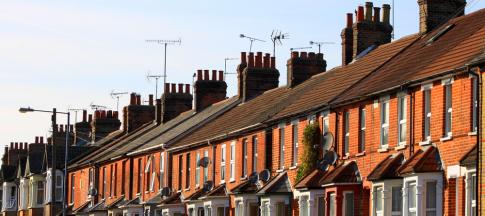
Choosing between new and old properties is just one of the (many) considerations when buying a house.
From energy efficiency and how modern they are to characterful spaces and period features, we discuss the pros and cons of each.
What to consider when buying a period house
While period properties have a certain kerb appeal when house-hunting, appearance isn’t everything.
Pros of buying a period property
There are lots of upsides to buying a period property, including:
- More space – they typically offer spacious rooms with high ceilings and big windows. Their gardens are typically bigger, and many have off-road parking.
- Thicker walls and substantial building materials – you’ll often find thicker walls, ornate features and a structure built to last.
- Prime location – they're often in prime locations in established communities, with amenities and transport links on the doorstep.
- Good investment – as only a limited number of period properties exist, they tend to keep their value. You also have the potential to add value with updates and improvements.
Cons of buying a period property
On the flip side, there are some downsides to buying a period property. These include:
- Less energy efficient – your home could take longer to warm up and be less effective at retaining heat.
- More maintenance – you’ll likely see more wear and tear, so the costs of upkeep and redecorating can add up. You might need to replace older wiring and plumbing at some point, and there’s a risk some older buildings might have asbestos and lead paint.
- Property chain – you might find yourself in an unpredictable property chain, making the buying process much longer than buying a home off-plan with no previous owners to worry about!
- Old heating system – there's a chance you could inherit an outdated boiler that might need to be repaired or replaced, which can be pretty expensive.
Tips for buying an old house
When buying an older property, it’s worth commissioning a level 2 or level 3 homebuyer survey to find any issues or areas of damage that aren’t immediately obvious.
Make sure you factor into your budget how you’ll pay for future repairs and the costs for any remodelling or extensions you’re planning.
Be sure to thoroughly examine your property. Check out cupboards, roof spaces and cellars, which can give clues to any problems.
Take a look at our guide on what to look for during house viewings to find out more.
What to consider when buying a new build
Buying your home brand new comes with plenty of benefits, but there are a few less appealing aspects to be aware of too.
Pros of buying a new-build property
- Energy efficiency – new builds have to follow the latest building regulations, so they can be more energy efficient. Plus, they're often cheaper to run because they’re well-insulated and fitted with more efficient plumbing and electrical fixtures.
- Building warranty and incentives – many new builds come with a 10-year warranty. Some developers also offer extra incentives, like paying your stamp duty.
- Bespoke design and modern living – you're often able to choose many of the fixtures and fittings in a new build. They’re usually designed for modern living with open-plan spaces and smart home features in mind.
- Low maintenance – you should be able to start enjoying your home straightaway, with no wear and tear.
Cons of buying a new build property
On the other hand, there are a few cons to buying a new-build property.
- Expensive to buy – new houses come with a premium price tag, and it can be hard to cover your costs in the short term if you choose to sell.
- Snagging – being brand new doesn’t necessarily mean it’s flawless, so it’s a good idea to get a ‘snagging survey’ done before you complete the sale to check for any issues.
- Lack of character and less space – new builds can lack individuality. Plus, to maximise developer profits, new houses are often built close together with smaller gardens.
- Build delays – if your new house is running behind schedule, which can happen, you may experience a delayed moving date. This could add to your costs if you need to pay for storage or unexpected rent.
Tips for buying a new-build home
There are a few things to remember when buying a new-build home:
- If you’re buying off-plan, the earlier you show interest in the development, the more room you have to negotiate on the price.
- Assess the land around your new potential property and decide if other homes will likely be built and make the area become a building site.
- Do your research on the building firm – do they have good reviews? Are they reliable?
What home insurance will I need when I buy a house?
Buildings insurance is often compulsory if you plan to buy a freehold property like a house with a mortgage. This covers the cost of rebuilding your home if it’s damaged.
If you're buying a leasehold property like a flat or maisonette, you won't need buildings insurance as your freeholder should cover this. But you can protect your belongings with contents insurance.
Or you can choose combined home insurance, which includes both buildings and contents cover.


